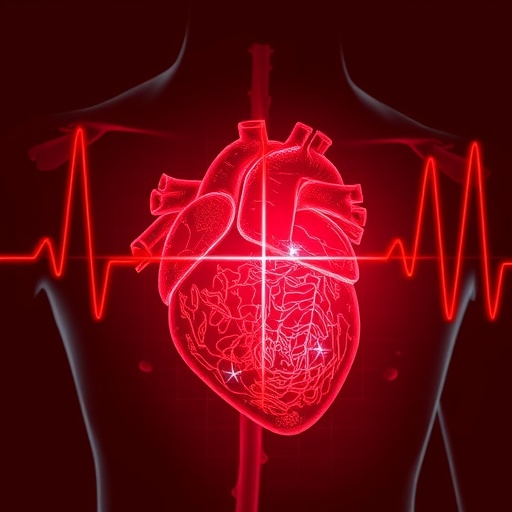In recent years, the intricate relationship between mental health disorders and physiological processes has garnered significant scientific interest. A groundbreaking study published in BMC Psychiatry in 2025 sheds new light on the complex interplay between systemic inflammation and autonomic nervous system function in individuals experiencing their first episode of depression. This meticulous investigation specifically examines how heart rate variability (HRV), a marker of autonomic nervous system balance, correlates with inflammatory markers across varying degrees of sleep disturbance in depressed patients.
Heart rate variability represents the subtle variations in time intervals between heartbeats, offering a window into autonomic regulation. High HRV typically reflects robust parasympathetic (vagal) tone, crucial for maintaining cardiovascular and emotional resilience. Conversely, diminished HRV is indicative of autonomic dysfunction, commonly observed in mental health disorders such as depression. Prior research has independently linked systemic inflammation—evidenced by cytokines like interleukin-6 (IL-6), tumor necrosis factor-alpha (TNF-α), and acute-phase proteins such as C-reactive protein (CRP)—to poor mental health outcomes. However, the nexus between inflammation, HRV, and sleep quality in first-episode depression remained inconclusive until now.
This study enrolled 76 patients diagnosed with moderate-to-severe first-episode depression alongside 30 healthy matched controls, stratifying depressive patients into three distinct groups based on their sleep quality assessed via the Pittsburgh Sleep Quality Index (PSQI). The groups represented low, moderate, and severe sleep disturbance, meticulously allowing the researchers to discern how varying sleep impairment levels modulate physiological interactions.
A battery of peripheral inflammatory markers—including IL-6, IL-1β, TNF-α, CRP, and erythrocyte sedimentation rate (ESR)—was quantified alongside comprehensive 24-hour HRV monitoring capturing time-domain and frequency-domain parameters. Notably, the study focused on parasympathetic-related HRV indices such as SDANN, SDNN, and high-frequency (HF) components, illuminating the vagal tone’s role in this pathological context.
The results unveiled a striking gradient of physiological alteration correlating with sleep disturbance severity. Patients experiencing severe sleep disruption exhibited significantly elevated systemic inflammation levels alongside pronounced reductions in parasympathetic HRV metrics. These findings suggest an exacerbated autonomic dysfunction aligned with heightened inflammatory load, emphasizing that the interplay between these systems intensifies with worsening sleep quality in depression.
Of particular interest was the discovery that significant negative correlations between inflammatory markers and HRV parameters emerged exclusively in the severe sleep disturbance cohort after adjusting for confounding factors including age, sex, body mass index, smoking status, and alcohol intake. This selective association underscores the critical role sleep quality plays in modulating the bi-directional communication between immune and autonomic systems in depressed individuals.
The mechanistic underpinnings behind these correlations likely involve a feed-forward loop whereby systemic inflammation impairs vagal nerve function, diminishing HRV. Subsequently, autonomic imbalance may potentiate inflammatory cascades, creating a self-reinforcing cycle that exacerbates both somatic and psychological symptomatology. These interactions may destabilize homeostatic regulatory mechanisms, thereby contributing to the clinical progression and severity of depressive episodes.
Clinically, these insights highlight the importance of integrating sleep assessment into psychiatric evaluations, as stratifying patients by sleep disturbance severity could refine prognostic predictions and therapeutic approaches. Interventions targeting inflammation and autonomic restoration—potentially including vagus nerve stimulation or anti-inflammatory pharmacotherapies—may offer novel avenues to mitigate symptom burden, particularly in patients with severe sleep impairments.
Furthermore, the findings lend support to a growing paradigm that depression is not solely a disorder of mood but also encompasses systemic physiological dysfunction. Recognizing depression as a multisystem disorder invites holistic treatment strategies addressing immune, neural, and behavioral dimensions simultaneously, enhancing the prospects for personalized medicine.
As sleep disturbances often precede or exacerbate depressive episodes, early intervention on sleep quality could prevent the amplification of inflammatory and autonomic dysregulation. This preventative angle may ameliorate the trajectory of depressive illness, reducing morbidity, and improving quality of life.
Although the current research robustly elucidates associations, causality remains to be established. Longitudinal and mechanistic studies will be indispensable to unravel the directionality and specific molecular pathways mediating these interactions. Advances in neuroimmune biomarkers and wearable autonomic monitoring technologies promise to deepen understanding and enable real-time clinical applications.
In summary, this comprehensive study advances our grasp of how systemic inflammation and autonomic nervous system dysfunction converge within the context of sleep quality in first-episode depressed patients. It calls for nuanced approaches that consider sleep disturbances not as mere symptoms, but as critical modulators of underlying pathophysiology and potential targets for intervention in depressive disorders.
Subject of Research: The interconnection between heart rate variability, systemic inflammatory markers, and sleep quality in first-episode depression patients.
Article Title: The association between heart rate variability and inflammatory markers in first-episode depressed patients with different sleep quality.
Article References:
Alimu, A., Malati, M., Ye, J. et al. The association between heart rate variability and inflammatory markers in first-episode depressed patients with different sleep quality. BMC Psychiatry 25, 927 (2025). https://doi.org/10.1186/s12888-025-07256-7
Image Credits: AI Generated
DOI: https://doi.org/10.1186/s12888-025-07256-7




